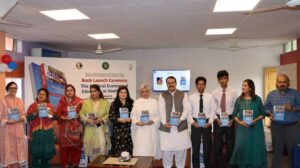NETWORK TREES: Students in remote areas travel to ‘network trees’ instead of school for online classes. High taxes makes it difficult for companies to rollout network to rural areas with low population density.
ECONOMYNEXT – The coronavirus pandemic has challenged every vestige of life we take for granted, and in the field of education, it has forced society to take a good, hard look at its methods of delivery, affordability and equal accessibility.
Even as technological advancements were gradually introduced in schools, it had mostly been limited to better serviced cities, and to students of the financially better off schools. Certainly, using internet based learning for school goers was hardly on the cards.
The pandemic forced governments in South Asia to rely heavily on technology to deliver lessons to students, though the manner in which it was imparted has been less than satisfactory as a large number of children, especially from low- and middle-income families, and those living in underserved locations have been short-changed.
Now, even as educationists seriously look at hybrid-learning for the future, there is a rich discussion on what that should be.
As well, text book dependency may well be a thing of the past, where information can be accessed via the internet. In this context, Parit Wacharasindhu, CEO of Startdee, Thailand questions why students need to attend school at all.
Speaking at a webinar on “Hybrid Learning; The Future of Education” Wacharasindhu’s provocative question is indeed appropriate in these times. As he explains, it is not about doing away with schools, but that it is time society looks at the role a school plays, critically.
It is his contention that schools be transformed into places where students find out about themselves, their likes and dislikes and what they want to do with their lives.
Schools must become institutions that provide children job ready skills. They must be taught to be innovate, and not be in jobs, where technology could easily replace.
Wacharasindhu sees schools as the place where students will develop a social consciousness, be the
voices against corruption, not just commit to memory what text books say on corruption and regurgitate that to pass an exam, but be trained to be active citizens.
The webinar, organised by the Friedrich Nauman Foundation for Freedom(FNF) was held on September 17, as part of its Restart Education in South Asia, series.
Moderated by the CEO of the City Montessori Schools in India, Roshan Gandhi, the panel included Ms. Baela Raza Jamil, CEO ofIdara-e-Taleem-o-Aagah, Pakistan and Dr. Parth J Shah, Founder President, Centre for Civil Society, India.
The pandemic has thrown up some positives in terms of education, says Jamil, who described how many teachers in Pakistan, have, sometimes of their own accord and through private sector involvement upgraded their technological skills to better serve their students.
Governments must recognise such teachers she says, even as there must be more attention paid to those who struggle to master technological advancements.
Another plus, say both Jamil and Shah is the level of parental involvement in the education of their children. With long periods of lockdowns, and learning taking place largely at home, even the dads got involved says Shah.
It’s a paradigm shift, he says, to see even the extended family getting involved in the education of their children.
Despite all that, the panelists’ state more needs to be done, and governments especially must invest more in ensuring a level playing field for all school going children.
A survey carried out in March, Jamil states, revealed the inequalities of the system. While the financially better off students have full access to internet based education, the survey showed that was not the case in 16 rural districts.
Even if students have access to the internet, it’s about whether they are using their smart phones or laptops.
That is determined by household incomes and now, it is a digital divide between students.
Jamil says that though nearly 40per cent of the population live below the poverty line, there has been quite an increase in the hybrid learning curve, and some form of investment by parents to support this form of learning.
In both India and Pakistan, the most affected are children studying in budget private schools, which cater to the low and mid income levels groups.
These are parents who prefer not to enrol their children in State run schools, but, in a bid to provide their offspring a head start in life, admit them to more affordable private schools.
In some instances, parents have opted to remove children from school, hoping to re-enroll them when the situation improves.
Thailand is dogged by teacher shortages, with one teacher often having to teach several grades. Would hybrid learning then, open the way for teachers of general subjects to teach across several schools?
Having a structured 9 a.m. to 3 p.m. classroom setting may not be the way to go says
Wacharasindhu,pointing out that the method would require a lot of data usage. Governments should consider, through public private partnerships to subsidise the internet for this purpose he suggests.
However governments charge high taxes from mobile telephony and telecom companies pay astronomical fees to South Asian governments which push up the up front cost of infrastructure, as well as operating costs, analysts say.
In a March 2021 spectrum auction Indian telecom operators paid 778.4 billion rupees for 856 MHz frequencies, amid warnings that Indian mobile charges are likely to go up.
Hybrid learning opens up the possibility to do away with outmoded teaching methods and
beliefs, Wacharasindhu adds, saying that one option is to introduce educational videos which students could watch prior to ‘attending’class.
That would allow teachers to introduce more action based education in keeping with modern trends.
There is also the issue of ethics and trust where teachers would have to be satisfied that students have not uploaded answers obtained from other tech savvy tutors.
Edtech companies, Wacharasindhu points out will have to be more socially responsible in ensuring better learning outcomes and in providing access to technology. Jamil agrees, ‘teaching must go beyond text books, and the voices of students, parents and teachers must be accommodated.’
Shah who explains that teachers have undergone a revolution of sorts owing to the pandemic, and adapting themselves to new teaching methods, adds that they will also need to be more innovative in ‘disciplining’ students.
It should be more about motivating students, he opines.
Just as webinars have replaced physical meetings in other sectors, teachers too now have the opportunity of consulting with colleagues not just across the country, but globally to keep abreast of trends, Shah points out.
Edtech companies must, says Jamil be sensitive to income needs of families and design models accessible to everyone. This pandemic has shown, that even in rural households there has been some investment in technology to help children with their studies.
In turn, schools too must take into account the realities of their student populations she adds, while Shah explains that the ‘one size fits all’ is not the way to design hybrid education.
Though countries such as Pakistan had introduced a dedicated TV channel for students, and a distance learning web, Jamil would like to see better financial commitment from governments. The government is working with Edtechs and talks of innovation funds, yet, she says there is not real financial commitment to support these plans.
Despite the disastrous setbacks brought upon by the pandemic, in the educational sector, it has opened up the space for change. Panelists agree that the ‘COVID Dividend’ must be exploited, to change mindsets, to close the gap between public and private schools, especially the less financially viable ones so students of all income levels have the same access to education.
As Jamil explains, it is time for governments to adopt a rolling policy on education which will be open to growth and changes and include all the voices of all stakeholders.
Source: Economynext.com




